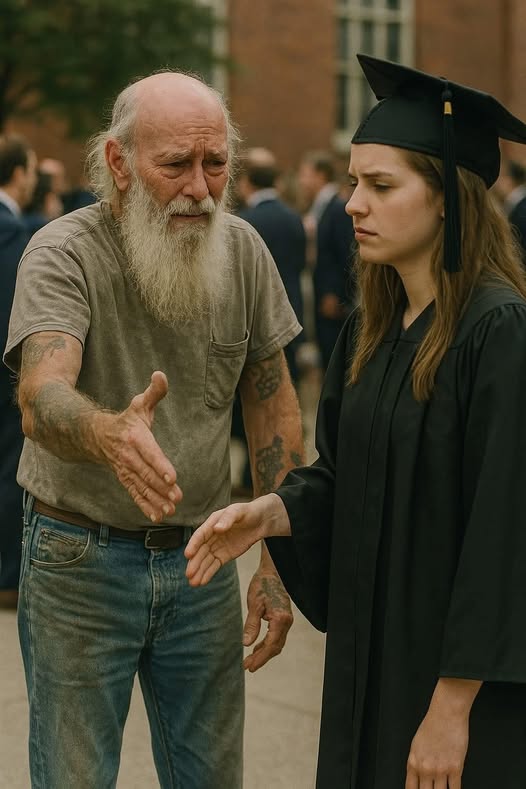Growing up, I always felt embarrassed by my father’s job. While my friends boasted about their parents’ prestigious careers—doctors, lawyers, businessmen—my father worked long hours in a garage, fixing motorcycles. It was a humble job, but for me, it felt like a constant reminder that we were different, and not in a good way. He was always covered in grease, his hands rough and calloused from years of labor. It wasn’t glamorous, and it wasn’t something I wanted to brag about at school.
I remember the endless questions from classmates, the curious looks when I mentioned my father. “What does your dad do?” they’d ask, and I’d hesitate. Should I tell them the truth? Or should I just lie and say he worked in an office, like their dads? But no matter what I said, it never felt like it was enough. I couldn’t help but feel like my father’s job was a reflection of who I was—someone not as worthy as the others. I hated him for it, even though I didn’t understand why.
As a child, I couldn’t comprehend why my father loved his work so much. Every time I’d complain about him being late for dinner or missing my school events because of a late job, he’d smile and tell me, “I’m doing what I love, kid.” To me, that didn’t make any sense. Love wasn’t supposed to come from a garage full of oil stains and tools; love should come from something more respectable, something that other people could admire.
The contrast between my father and the fathers of my friends couldn’t have been more stark. My friends’ dads wore suits, drove shiny cars, and spoke about complicated topics like mergers and contracts. My dad wore overalls, drove an old, beat-up truck, and spoke passionately about engines and parts I could barely understand. At school, I’d listen to my friends talk about their dad’s achievements and wish mine had the same kind of recognition. I didn’t realize then that recognition didn’t matter to him. It was something he had long since let go of.
When I turned sixteen, my father offered to buy me a motorcycle. I nearly laughed in his face. “You know I don’t want a bike, Dad. I want a car like everyone else.” I remember the hurt look on his face. “It’s not just about the bike,” he said. “It’s about teaching you how to work for something, how to appreciate what you have.” But I couldn’t see it then. All I saw was the bike—a symbol of the life I didn’t want. The life my father had chosen, but I had never understood.
As I grew older, I started to resent my father even more. While my friends went off to college, their parents helping with tuition and giving them the luxury of a comfortable lifestyle, I was working at my father’s shop every summer to help pay for my own expenses. My father would always encourage me to go to college, but his idea of encouragement often felt like pressure. “Work hard,” he’d tell me. “You’ll earn it, just like I did.” But it never felt like enough. I couldn’t understand why he didn’t want to help me more, why he couldn’t be like the other parents.
I spent years building my own career, determined to prove that I was nothing like my father. I went to business school, got a good job in an office, and surrounded myself with people who valued the same things my friends’ parents valued—status, money, success. I didn’t even speak to my father for months after I graduated. The gap between us only seemed to grow wider as I became more entrenched in my “successful” life, and he remained in the same small garage, working with his hands.
Then one day, I received a call from my father’s mechanic shop. “It’s time, kid,” he said, his voice raspy but steady. He needed help with something—nothing big, just a project he couldn’t finish alone. Something inside me shifted when I heard his voice. I hesitated, then agreed. When I arrived at the shop, I saw the familiar clutter of tools and motorcycle parts, but this time it didn’t seem as foreign to me. My father’s pride in his work, in every project he took on, was something I had never fully appreciated before.
That day, we worked side by side, fixing an old motorcycle. As I handed him tools and listened to him talk about the mechanics of the bike, I began to realize something I had never understood before: my father wasn’t just working for survival. He wasn’t chasing status or wealth. He was working because it brought him joy. He didn’t need anyone’s approval. He didn’t need to be a doctor or a lawyer. He had found purpose in something that filled him up, and in that moment, I understood.
It took years for me to finally understand what my father had been trying to teach me all along. It wasn’t about the title or the money. It was about doing what you love and doing it with pride. I didn’t need a prestigious job to feel validated; I needed to find something that mattered to me, something I could be proud of. And while I’ll never be a motorcycle mechanic, I realized I had a lot more in common with my father than I thought. He had taught me something invaluable: that true success isn’t about being admired by others, but about being at peace with who you are and what you do.
